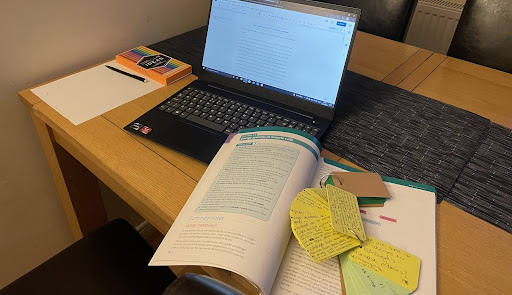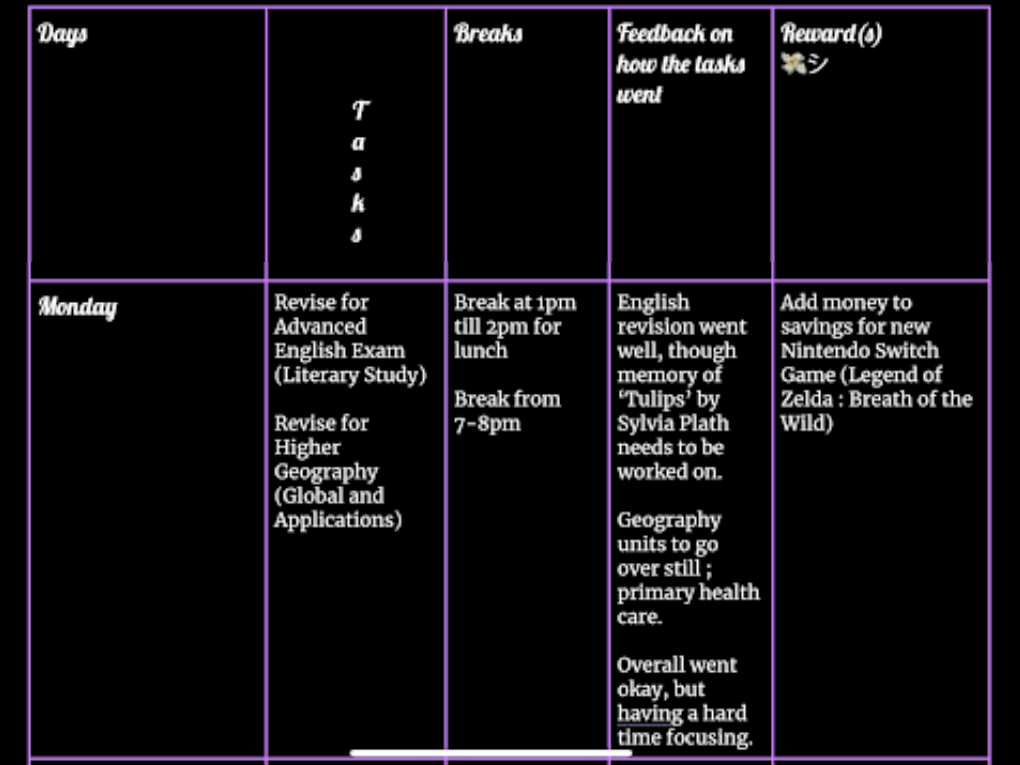What Is Demotivation?
Demotivation can be defined as when someone loses interest or enthusiasm for their work/certain activities. I believe everyone experiences some form of demotivation in different stages of life – whether this be down to burnout from overworking or an inability to focus. I feel the topic of demotivation is an especially prominent one today because of the pandemic, with lockdown playing a major role in disrupting the ‘normal’ workflow for both students and adults across the UK.

My Experience
At one point during lockdown, I got really down over my lacking motivation. I had worked so hard in previous school years and this year I’m aiming to get into university, so I felt a need to really put the effort in…but I just couldn’t. It’s like I couldn’t comprehend or memorise anything, things going in one ear and out the other. It was a constant frustration with myself, feeling like I was lazy, or that I didn’t even really want to go to university. This, however, was far from the truth!
I realised after a while that I had lost sight of what I was working towards. It was like I was so focused on the present of cancelled exams, COVID-19 (deaths, new numbers everyday etc) and being unable to go anywhere or see anyone that I had completely blanked out any dreams I had, any hobbies or passions or the good things generally. Therefore, I began my mission of trying to regain my ambition.

Tips On How To Get Motivated
Burnout
If you are demotivated in terms of burnout, you often feel tired all the time. You lose interest in socialisation, have no energy and feel more compelled to waste time away by sleeping or sitting on a device all the time. A big problem with burnout is that it doesn’t just stop us from being productive, but also manipulates our ability to do things we’d usually enjoy. In my case, I wasn’t even able to will myself to read or play games because it felt like a chore.
I think the way to get out of the burnout slump is to, essentially, rest the mind and body. If you get enough sleep, psychologically speaking, you restore your mind. The next step after this would be to think about what’s important to you. I recommend making a list of little things you want to achieve, building up to bigger things, and making a schedule of how you’re going to achieve said things in a sustainable manner (think about days you want a break to spend with friends, or a ‘lazy day’ to give your brain a break). It’s okay to take time for yourself! Hard work is admirable, but only when you can maintain it.
Inability to focus
Sometimes, it can just be really hard to knuckle down and focus on the tasks right in front of you. You feel like you’d rather be doing anything else, or you get distracted so easily that you drift away from completing the work – only to feel bad about it later, but still unable to force yourself into doing something you feel you gain nothing from. I think to combat this, there are two options: making a reward system or asking for help (next section).
I think the most efficient way to create a reward system is to make a work chart – a chart made by yourself/family or friends in order to give you a reason to work. For example, here is a work chart I created:

Using this, I can schedule my week. I can insert what work I want to do on a specific day, breaks I want to take and give feedback on how I felt things went. The reward is the motivator and you’re working towards gaining something you want/have an interest in and therefore you feel more inclined to put the effort in. This can help increase focus because of determination to gain some extra time with friends, a day out or even a new game. The rewards provide a reason, while completion of the work gives you positive re-affirmation that you can do anything you set your mind to! Following this system with praise and consistency can lead to you having better ability and self-control overall ? one day not even needing the rewards.
Asking For Help
Asking for help is an important part of finding your enthusiasm again, not only for work but for life too. It’s okay to feel like you are unable to get out of the hole yourself, there are helping hands around you – family, friends, teachers or even online self-help schemes. Asking for help is not embarrassing or weak, it’s identifying an issue and looking for a solution, which takes courage and shows your desire to better yourself.
Visit the AyeFeel page for a list of different organisations you can get in touch with if you want to speak to someone.
Trying Your Best
At the end of the day, life is like a game. It’s not about winning or losing (succeeding or giving up), it’s about the experience itself and achieving the small things along the way. As long as you keep trying, whether you be successful the first time or the 30th, you are winning because you’re moving forward. Keep putting your best efforts into completing the things before you, tackle them with all your might and no one, not even yourself, can find fault. Motivation is something that comes and goes throughout our life, it’s a natural process ? you just need to remember you are the one who needs to bring it back, you can promote change within yourself with or without the support of others.

Remember to look after yourself and think about your own mental health and emotional wellbeing.
Take a look at our Mindfulness Monday videos if you’re looking for some mindfulness activities.
If you’re interested in volunteering, visit the #YSHive page to see what volunteer opportunities are available with Young Scot.
Visit the AyeFeel Blogs page to check out more blogs.
Young Scot supports young people to share their own voices, views and opinions and works with partner organisations and professionals who are experts in different topics. The views expressed in this blog are those of the young people, organisations and/or individuals who have taken part in the blog, not necessarily the views of Young Scot.
Young Scot supports young people to share their own voices, views and opinions and works with partner organisations and professionals who are experts in different topics. The views expressed in this blog are those of the young people, organisations and/or individuals who have taken part in the blog, not necessarily the views of Young Scot.
